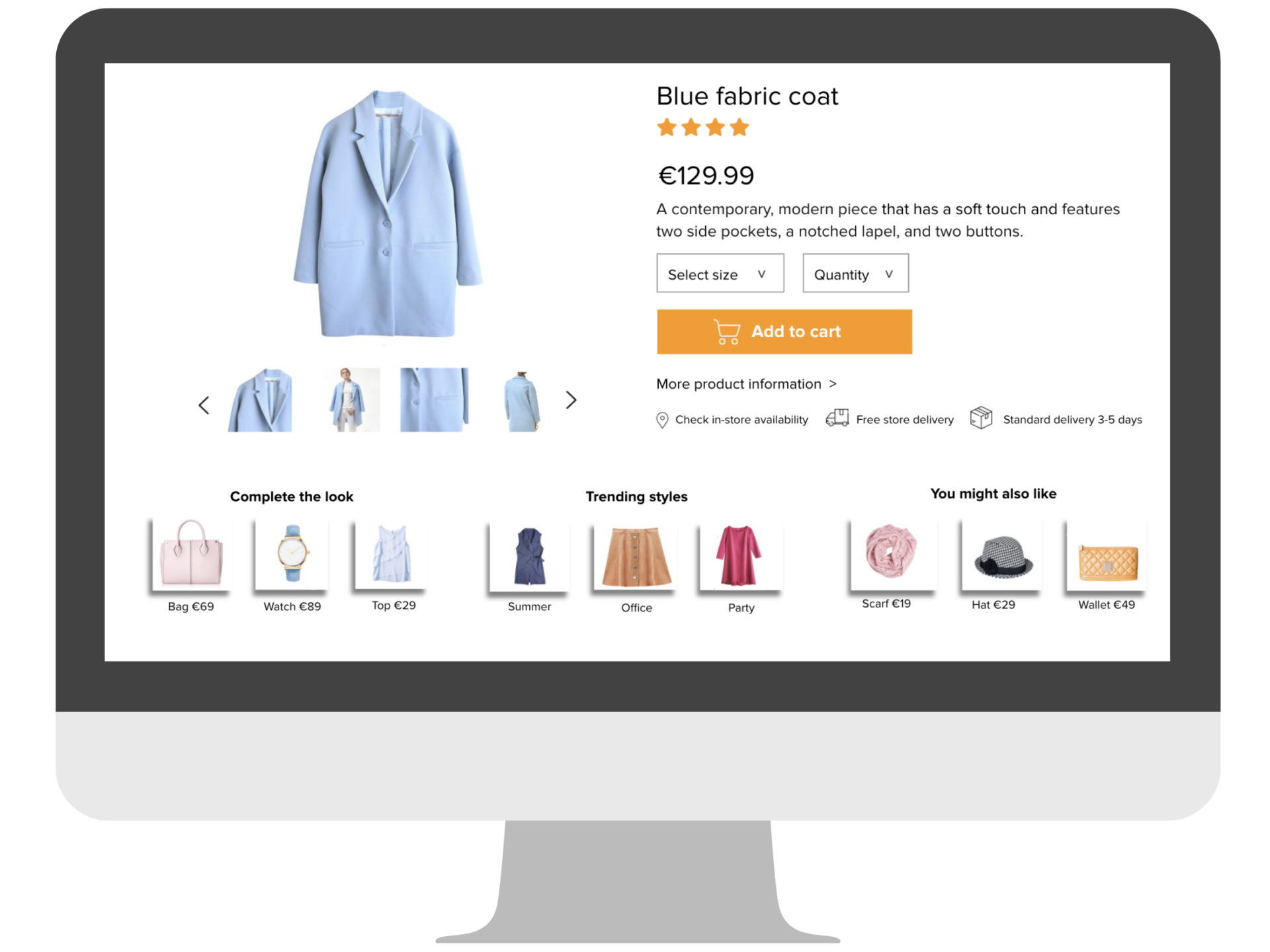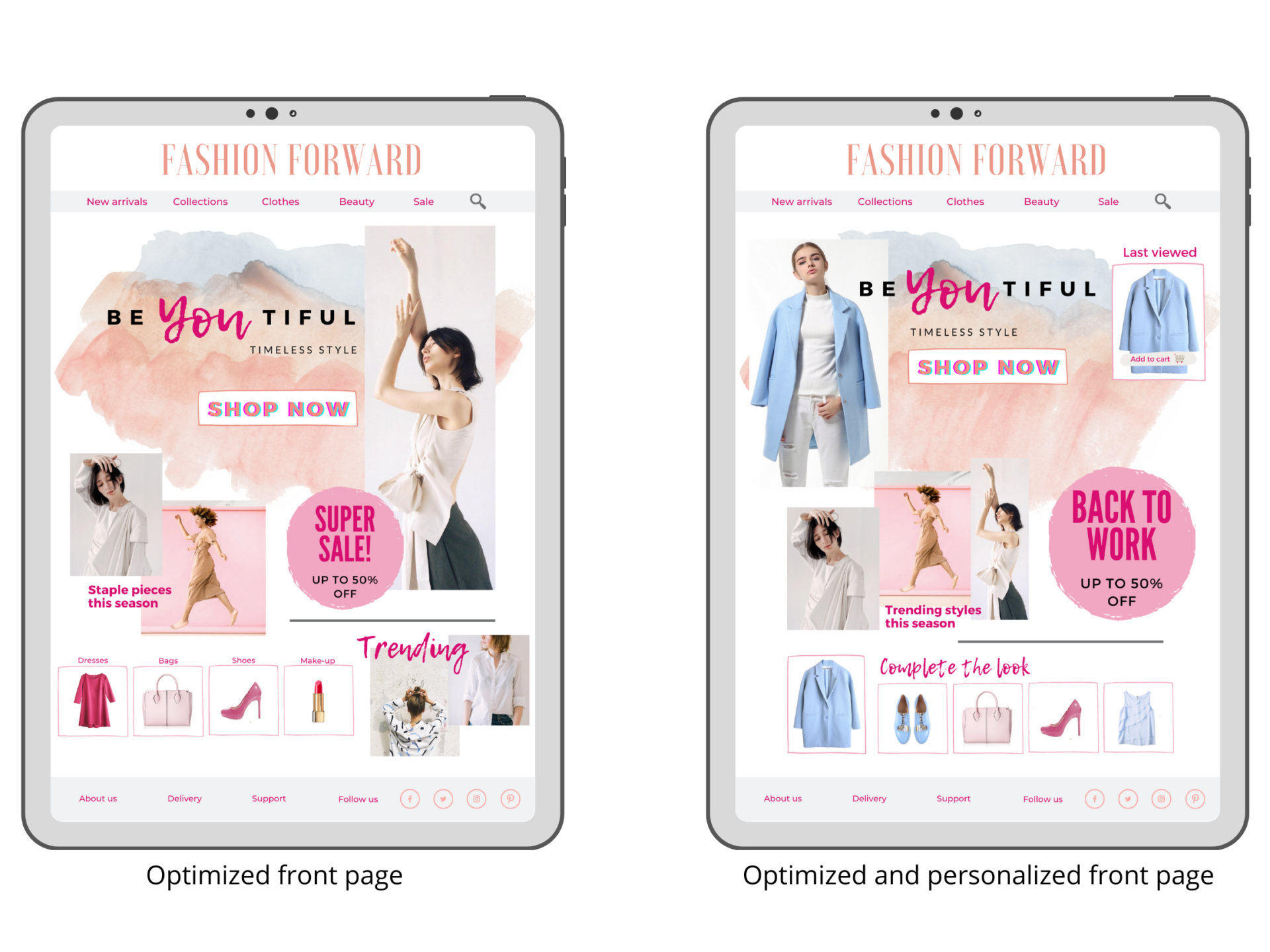Enhancing fashion ecommerce: 6 challenges to overcome with website personalization
Fashion ecommerce has revolutionized the way we shop for clothing and accessories. From the comfort of our homes, we can explore endless options, discover new trends, and make purchase decisions with just a few clicks.
However, the fashion industry brings its own set of challenges to online retailers. As many online stores sell the same brands and products, the competition is fierce. In the current economic climate, the growth of the industry has slowed down and many consumers are more conscious about making purchases.
Personalization is something consumers have come to expect. In fact, 71% of consumers expect personalization in online stores, and 78% get frustrated if there isn’t any. Consumers exposed to personalized content are more likely to convert, repurchase, and recommend the business to their friends.

In this blog post, we will first delve into some of the specific challenges that fashion ecommerce faces and then provide some practical tips on how website personalization, powered by AI-driven technology, helps overcome them.
1. Emotional customer experience
Fashion products are highly personal. While a customer may have some specific requirements for their garments, such as material, size, or price, the purchase decision is always at least partly an emotional one. Therefore, customers don’t only expect relevant recommendations, and intuitive browsing, but also a sense of connection with the brand or retailer.
Cookie-cutter personalization may not do the trick – you want to go hyper-personal. Deliver tailored content, product recommendations, and promotions based on individual preferences, browsing behavior, location, and purchase history. By offering a unique shopping experience, you can enhance customer engagement, satisfaction, and loyalty.
2. Predicting emerging trends
As fickle as the weather, fashion trends come and go, and being able to anticipate them is crucial. By leveraging personalization data, retailers can swiftly identify emerging trends, adapt their strategies, and gain a competitive edge.
This data allows them to detect shifts in customer preferences with remarkable speed, which is particularly beneficial in the fast fashion industry where trends can change overnight. With this valuable insight, retailers can quickly adjust their inventory, marketing campaigns, and promotions to stay ahead of the curve.
3. Fast-turning product assortment
The impact of trends extends beyond just keeping up with the latest styles; it also affects the speed at which fashion retailers must update their product assortments. Personalization plays a key role in optimizing product assortments by showcasing the most relevant and in-demand items to individual customers.
By tailoring the product recommendations and collections based on customers’ preferences and browsing behavior, retailers can ensure that they are offering the right products at the right time. This not only enhances the shopping experience for customers but also increases the likelihood of conversions and repeat purchases.
Furthermore, personalization can be utilized to tackle the challenge of slow-moving or outdated inventory. With inventory-based personalization, retailers can promote these items to specific customer segments who may have an affinity for them.
4. High return rates
Returns pose a significant challenge in fashion online retail, impacting profitability and operational costs. Website personalization can help reduce returns by providing customers with accurate sizing recommendations, detailed product descriptions, and user-generated content such as reviews and ratings.
By offering personalized guidance, you enable customers to make more informed purchasing decisions, reducing the likelihood of returns and improving overall customer satisfaction.
5. Customer engagement
Building strong and lasting relationships with customers is crucial for fashion brands and retailers. Personalized experiences create a sense of exclusivity and connection with the brand.
Through website personalization, you can deliver personalized communication, tailored marketing campaigns, and loyalty rewards. Implement personalization throughout the customer journey, from product discovery to checkout. You drive engagement and increase your customers’ lifetime value when the customers feel that they are recognized and remembered.
6. Sustainability
With increasing awareness of sustainability, customers are seeking fashion brands that align with their values. Website personalization can contribute to promoting sustainable fashion choices.
By showcasing eco-friendly products, providing educational content on sustainable fashion practices, and encouraging conscious shopping behaviors, you can align your business with customers’ desires for a more ethical and sustainable fashion industry.
Mitigate fashion ecommerce challenges with personalization
As you’ve seen, personalization can help address many of the challenges specific to the fashion ecommerce industry – but where to start? Here are some practical solutions to consider:
- Hyper-personal shopping experience. Create a unique user interface or design for each customer, personalizing their home, category, and checkout pages. You can even build your entire storefront on personalized recommendations. This is where affinity tracking really shines: You can show recommendations based on different product attributes for different customers. For example, for an eco-conscious customer, you can make sure that sustainable products are always prominently displayed.
- AI-driven product recommendations. By analyzing your past purchase history and browsing behavior, you can curate a tailored selection of similar or complementary products that pique a customer’s interest, guiding them towards fashion triumphs with each click. For best results, combine behavioral data with contextual information. AI-driven recommendations are based on algorithms that continuously test and optimize content.
- Location-based personalization. Deliver a hyper-localized shopping experience by customizing content and product offerings based on the customer’s geographical location. For example, you can show different prices based on the customer’s area or display products appropriate to the weather in where they reside.
- Intelligent search personalization. Search is the first, and often the most important, touchpoint between consumers and ecommerce sites. Personalized search provides consumers with suggestions for search terms, brands, categories, and products based not only on their search queries but their affinity and recent interactions on the site.
- Personalized omnichannel communication. Send personalized email campaigns and push notifications with content that resonates with each customer’s unique interests and preferences. Keep your customers in the loop with updates on new collections, exclusive discounts, and tailor-made fashion insights. Make sure that when a customer clicks a link in the email, the same experience continues on the website.
- Exclusive personalized offers. Send tailored discount codes or exclusive offers for a customer’s favorite clothing brands or categories based on their browsing history or past purchases. This level of personalization not only entices customers to make repeat purchases but also strengthens their loyalty to the business.

Fashion ecommerce poses unique challenges, but with the power of AI-driven website personalization, these challenges can be overcome. By focusing on enhancing the customer experience, optimizing product assortment, reducing returns, driving customer engagement, and promoting sustainable fashion, fashion brands can thrive in the online marketplace.
Frosmo’s AI-driven personalization technology offers tailored solutions to tackle these challenges head-on, providing a competitive edge in the fast-paced world of fashion ecommerce.